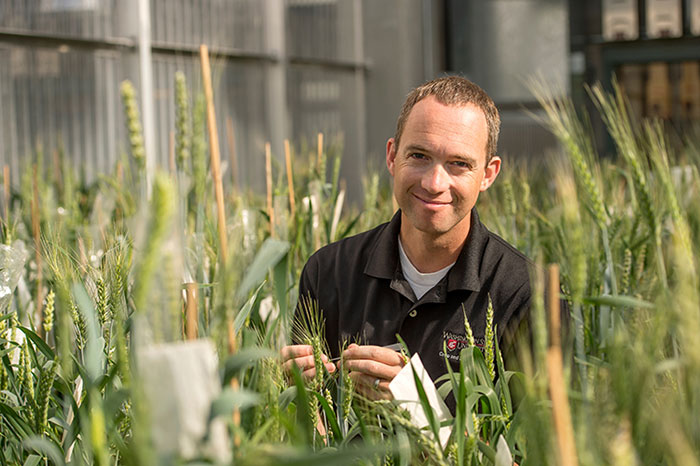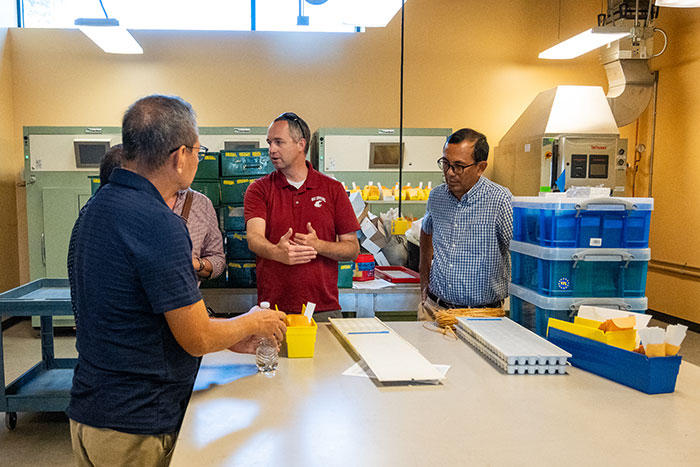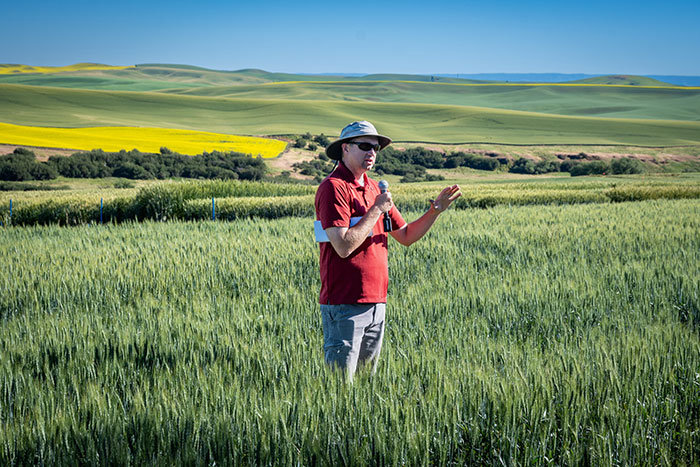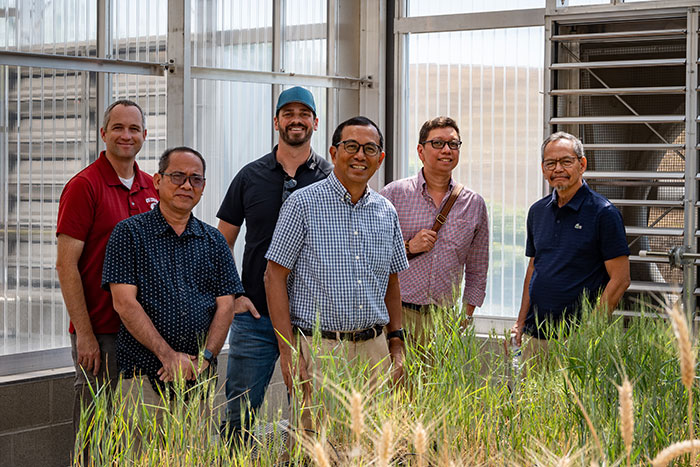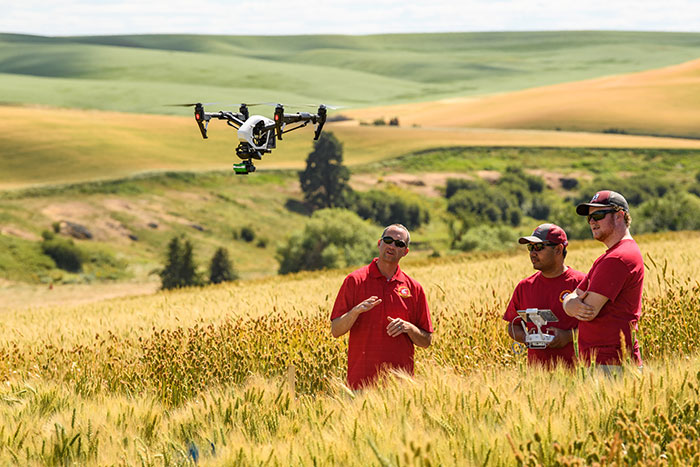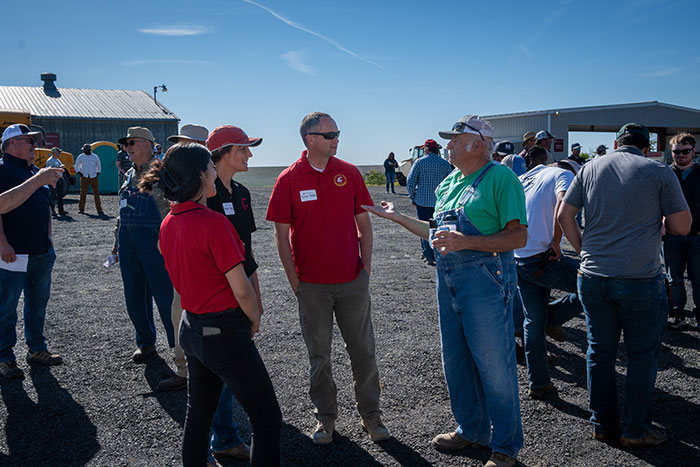Commission recognizes the work of Washington State University winter wheat breeder
The Washington Grain Commission (WGC) is recognizing Washington State University (WSU) winter wheat breeder Arron Carter and celebrating his contributions to the Washington wheat industry.
A professor in WSU’s Department of Crop and Soil Sciences, Carter recently became the sole holder of the O.A. Vogel Chair of Wheat Breeding and Genetics, previously co-held with WSU spring wheat breeder, Mike Pumphrey.
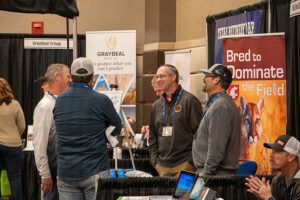
“Washington wheat farmers are fortunate to have someone like Arron leading the winter wheat breeding program. His ability to balance scientific innovation with the real-world needs of farmers ensures our crops are competitive globally while being practical to grow locally,” WGC CEO Casey Chumrau said. “Beyond his success in breeding, his dedication to our community and the industry sets a high standard for excellence. Arron is a true advocate for Washington’s farmers, always listening to their needs and translating those insights into solutions that improve their livelihoods.”
The O.A. Vogel Chair of Wheat Breeding and Genetics was the first of six research endowments created by the WGC at WSU to establish a perpetual funding mechanism for the advancement of the commission’s strategic research goals. The Vogel chair was established in 1990 through a partnership with the state of Washington, WSU, and the WGC.
“What impresses me most about Arron is his humble, hard-working demeanor. Whether it is in the field, the classroom, or on a trade mission, he is a tremendous representative for WSU and the college and always puts the best interest of growers and his students first,” said Wendy Powers, Cashup Davis Family Endowed Dean of the College of Agricultural, Human, and Natural Resource Sciences.
WSU and the Vogel chair work closely with the WGC and wheat growers to understand the needs for the industry, then respond with opportunities to exceed those needs.
“This partnership is of great value to WSU,” Powers said. “Through dialogue and collaboration, we build a more resilient grain industry and, therefore, a more resilient Washington, which is at the heart of the land-grant mission.”
As Vogel chair, Carter participates in trade team and technical servicing activities through U.S. Wheat Associates (USW), the export market development organization for the U.S. wheat industry. “Arron’s availability and willingness to engage with overseas buyers through USW activities and with our growers here at home has helped us foster a critical connection between innovation in wheat breeding and the needs of our global customers,” WGC Vice President Mary Palmer Sullivan said. “Whether hosting trade team tours or participating in technical exchanges, he ensures the quality and performance needs of customers are heard and incorporated into his breeding program, all while delivering the yields and agronomic traits growers depend on.”
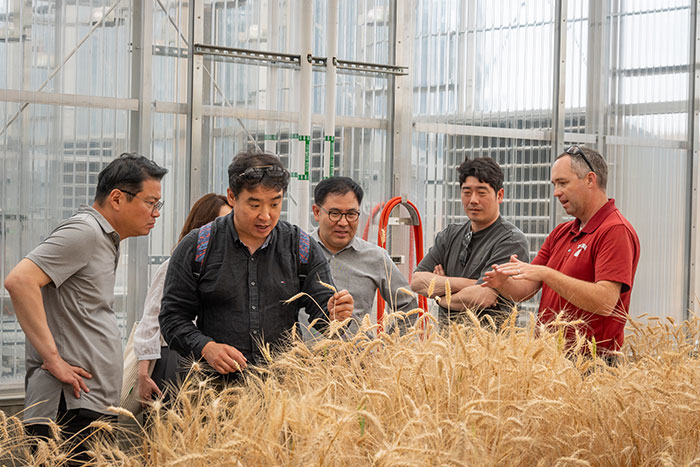
For example, Carter participated in a Wheat Quality Improvement Team (WQIT) trip to Latin America in December of 2018, visiting with wheat buyers in Mexico, Guatemala, Costa Rica, and Peru to learn about the end-use quality factors that Latin American buyers value.
“Arron is a once-in-a-generation wheat breeder bringing new technology and methods coupled with persistence to his work,” said Steve Wirsching, vice president and director of the USW West Coast Office located in Portland, Ore. “He is a natural leader amongst his peers and in the Wheat Quality Council, where many of his soft white varieties have been recognized for genetic gains for yield and quality.”
Carter was named the WSU winter wheat breeder in July 2009 after completing his doctoral degree with an emphasis in wheat breeding and genetics earlier that year. Using a combination of traditional plant breeding methods, molecular marker technology, and biotechnology, his breeding program focuses on high-yielding, disease-resistant varieties with good end-use quality that will maintain profitability and reduce the risk to growers.
“The best thing about being the Vogel Endowed Chair is the continued interaction I get to have with the growers and working with them to improve cultivars through continued research. The funding allows me to rapidly begin addressing the needs of growers in Washington and the needs of the breeding program and then leverage that for additional competitive funding,” Carter said. “Looking forward, I am really excited about working on new sources of herbicide tolerance in wheat to provide growers additional options for weed control.”
According to the U.S. Department of Agriculture, 85% of all wheat acres planted in Washington in 2024 were winter wheat. Carter’s winter wheat breeding program makes 800 crosses annually, evaluating about 60,000 head rows and 20,000 yield plots, along with operating four observation nurseries for disease ratings. This is comparable to other national public programs with a large impact on the industry.
Over the last 15 years, Carter has led the winter wheat breeding and genetics program to release over 20 new winter wheat cultivars that address a wide range of pests, diseases, and environmental factors present in the Pacific Northwest region. These range from plant resistance for stripe rust and snow mold (among others), to bolstering traits for emergence and falling number scores, and providing additional tools to growers in their cropping systems through CoAXium wheat varieties, and, most recently, a variety with Metribuzin tolerance.
“Continuous improvement is the hallmark of the winter wheat breeding program,” Powers said. “Arron has a strong vision and plan for the program that deploys the latest technologies and, in return, produces the best possible product and strong returns for growers long into the future.”
The Vogel endowment was established with an initial principal of $1.5 million. Through investment growth, the Vogel endowment now stands at over $3 million. Its 2023-24 research distributions were nearly $121,000. There are five additional research faculty positions that are funded in part by WGC endowments aimed at improving varietal development, end-use and processing attributes, agronomics, production systems, economics, and new uses for wheat and barley.
The endowments are managed by WSU with distributions made annually to the research and extension program of the faculty researcher holding the endowment. These endowments are perpetual and require no further contributions from the WGC to continue funding work on behalf of the wheat and barley industries and the state’s small grain producers into the future.
This article originally appeared in the January 2024 issue of Wheat Life Magazine.
